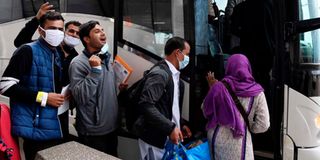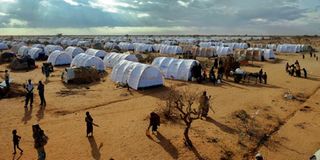Premium
How countries accept or reject refugees

Members and supporters of New York's Afghan community hold placards as they attend a march and protest aiming to raise awareness of Afghanistan's refugee crisis following the Taliban takeover, in New York on August 28, 2021.
African countries have taken divergent stances on whether to host refugees from Afghanistan.
Last month, Uganda and Rwanda became the first on the continent to accept fleeing Afghani refugees following the power retake by the Taliban.
South Africa, on the other hand, refused to take the refugees, saying its hands were full.
A statement issued by the South African department of International Relations and Cooperation (DIRCO) hinted there had been “overtures” to have the country accommodate refugees in transition to other countries of settlement.
“The South African government is unfortunately not in a position to accommodate such a request. South Africa is already home to a substantial number of refugees and is seized with addressing their needs. Most of them already benefit from the social assistance and free medical health programmes offered by our country.”
Pretoria also said the wellbeing of the refugees could be better served in Pakistan, their first country of arrival.
This video grab obtained from the Uganda Broadcasting Corporation on August 25, 2021 shows the convoy with first group of Afghan evacuees to reach Uganda on the road from the airport.
Politics and economics
In general, there may have been political or even monetary considerations.
Uganda, renowned for refugee hospitality in Africa, hosts about one million of them, mostly from the Democratic Republic of Congo and South Sudan.
Hosting refugees is, however, a burden and Kampala has in the past tried to resolve conflicts in the region to ease this burden.
For Afghanistan refugees, being in transition means the temporary host must be enticed to accommodate them. The US, which requested Uganda to host the refugees, will be footing their accommodation bill.
For Rwanda, hosting Afghani refugees may firm up its growing ties with Qatar.
Qatar had been the mediator in talks between the Afghanistan government and the Taliban for most of last year and its influence on the troubled country is still immense.
Rwanda will mostly host students who have relocated in preparation to settle in another country.
Which international law?
Accepting or rejecting refugees, though, must be based on law.
In an interview with the Nation.Africa, Ms Eunice Ndonga-Githinji, Executive Director of the Refugee Consortium of Kenya (RCK), said countries on the continent are bound by laws that ensure refugees’ rights are protected.
“At the international level, there is the 1951 UN Convention relating to the status of refugees and the 1967 Protocol relating to the status of refugees,” Ms Ndonga-Githinji said.
Her organisation is a non-profit that promotes the rights of refugees, internally displaced people, asylum seekers and other forced migrants in Kenya and the wider East African region.
“Regionally, we have the 1969 OAU (Organisation of African Unity, now African Union) Convention governing the specific problems of refugees in Africa, and at the national level there are State laws such as the 2006 Refugees Act in Kenya. Most countries have bilateral agreements to facilitate this further.”
Eunice Ndonga-Githinji, Executive Director of the Refugee Consortium of Kenya.
No absolute rights
These rights, she notes, are not absolute for refugees or those seeking any kind of safety beyond their country of birth.
“Everyone has the right to asylum but every country has the right to grant or refuse entry into its territory,” she said.
“That is where non-refoulement comes in as a safeguard to protect asylum seekers who should be granted access unless they are a threat to the national security or public order of a country.”
Non-refoulement is supposed to guarantee no return to a country where one would “face torture, cruel, inhumane or degrading treatment or punishment and other irreparable harm”.
This applies to all migrants, at all times, irrespective of their migration status.

Afghan refugees board a bus after arriving at Dulles International Airport on August 27, 2021 in Dulles, Virginia, after being evacuated from Kabul following the Taliban takeover of Afghanistan.
Enticement to host
RCK does not normally analyse the enticement countries get to host refugees.
Countries can generally decide how long to host refugees but can’t expel those who feel insecure leaving. Hosts can, however, decide where to accommodate refugees.
“All countries are sovereign and can decide where to host refugees who are known as asylum seekers unless they are prima facie refugees. Regarding how long, a country cannot force a refugee to leave its territory and enter a territory where they would be persecuted, due to the non-refoulement principle,” Ms Ndonga-Githinji explained.
“Thus, countries should host refugees for as long as they are unable to return to their countries of origin.”
Benefits of hosting
Either way, hosts have inherent benefits that come with hosting refugees.
RCK, formed in 1998 to promote refugee rights in the region, says it has observed that host communities usually reap from the incomers too.
“For Kenya, many nationals and local economies have benefited from working in refugee camps. The local economies where the refugee camps are, have also gained revenue through trade and other mechanisms from the presence of refugees.
“Garissa, Dadaab, Kakuma and Lodwar towns have all grown due to the presence of refugee camps. Kenya has honoured its international obligation to offer asylum to people who are forced to leave their countries due to fear of persecution due to their race, religion, nationality, membership to a social group or political opinion,” the official added, referring to the refugee camps in Garissa and Turkana counties in Kenya.

A file photo taken on July 31, 2011 shows Somali refugees walking in the new Ifo-extension at the Dadaab refugee camp in Kenya, the largest refugee camp in the world.
Problems
There are problems too.
RCK studies indicate Kenyans and refugees have in the past fought over meagre resources such as water and firewood.
Locals complain of environmental degradation including tree cutting to make temporary huts and for firewood. It is not a static problem, however.





